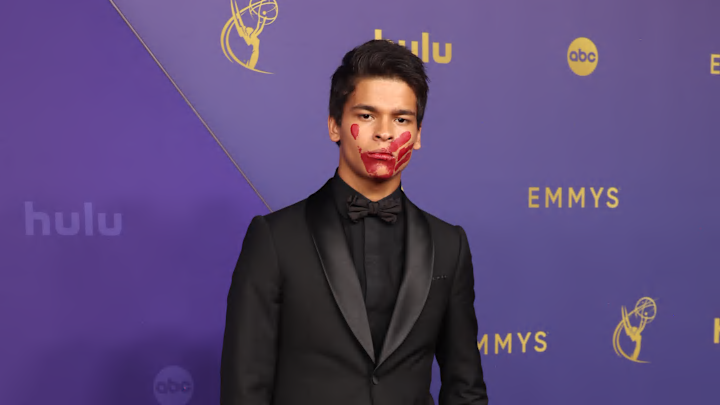If you missed the Emmy red carpet, you might not have known that Reservation Dogs star D’Pharaoh Woon-A-Tai arrived with an important symbol on his face. However, during the opening by Eugene and Dan Levy, the camera panned to the actor as the father-son duo cracked a joke about the Television Academy "discovering" a well beloved comedy series that's being honored for the first time in the acting and series categories this year despite being critically-acclaimed since its freshman season.
Woon-A-Tai is up for Outstanding Lead Actor in a Comedy Series for his performance as Bear Smallhill and he's using the moment to shine light on a very serious cause. The red handprint across his mouth represents solidarity with Missing and Murdered Indigenous Women whose stories are not often told and who are largely ignored by the media and law enforcement.
Native Hope--an organization dedicated to "address[ing] the injustice done to Native Americans" and who share Native stories, educational resources, and assist Native communities--explains the symbol in full.
"A red hand over the mouth has become the symbol of a growing movement, the MMIW movement. It stands for all the missing sisters whose voices are not heard. It stands for the silence of the media and law enforcement in the midst of this crisis. It stands for the oppression and subjugation of Native women who are now rising up to say #NoMoreStolenSisters."
D'Pharaoh Woon-A-Tai poses for photos at the #Emmys. https://t.co/OwvzFOEqA5 pic.twitter.com/mH9bTWtphB
— Variety (@Variety) September 15, 2024
While the plight of Indigenous women, in the U.S. and Canada, has been talked about on the national stage, the conversation around the missing and murdered girls and women of the community hasn't had the focus that it dearly needs.
According to the Bureau of Indian Affairs, Native American and Alaska Natives experience murder, rape, and violent crime at rates higher than the national average. And, per the data, a significant portion of the people who've gone missing or have been murdered are Native American and Alaskan Native women.
The above information, however, is not common knowledge. This why the short-lived broadcast series Alaska Daily was important. The ABC drama followed an Anchorage daily metro newspaper where two investigative journalists Eileen Fitzgerald (Hilary Swank) and Roz Friendly (Grace Dove) reported on the Missing and Murdered Indigenous Women crisis. There was nothing like it on network television and its unfortunate that the show had only one season.
Woon-A-Tai's experience on Reservation Dogs has sharpened his resolve to spotlight his community and use his platform. His red carpet appearance is an example of this and his work going forward will be as well. In an interview with Variety, the Canadian actor shared the following about how he sees the trajectory of his career:
"One thing that it’s taught me moving forward with other projects, especially Indigenous-centered projects, is that it has to be with an Indigenous writer and director. Before, I was just so used to working with a lot of non-Indigenous people. “Reservation Dogs” has taught me how important it is that we are the ones to tell our stories for us. Nobody should tell our stories on our behalf. That’s been going on for too long. We’ve had too much misrepresentation because of it. Moving forward, I am very much going to stick with telling Native stories through the Native lens."
Reservation Dogs is nominated for Outstanding Comedy Series on tonight's Emmys. The ceremony will be available to stream Monday, Sept. 16 on Hulu. Stay tuned to Hidden Remote for more TV news and coverage. We'll keep you up to date on what's got people buzzing about network TV.
All three seasons of Reservation Dogs are available to stream on Hulu.
